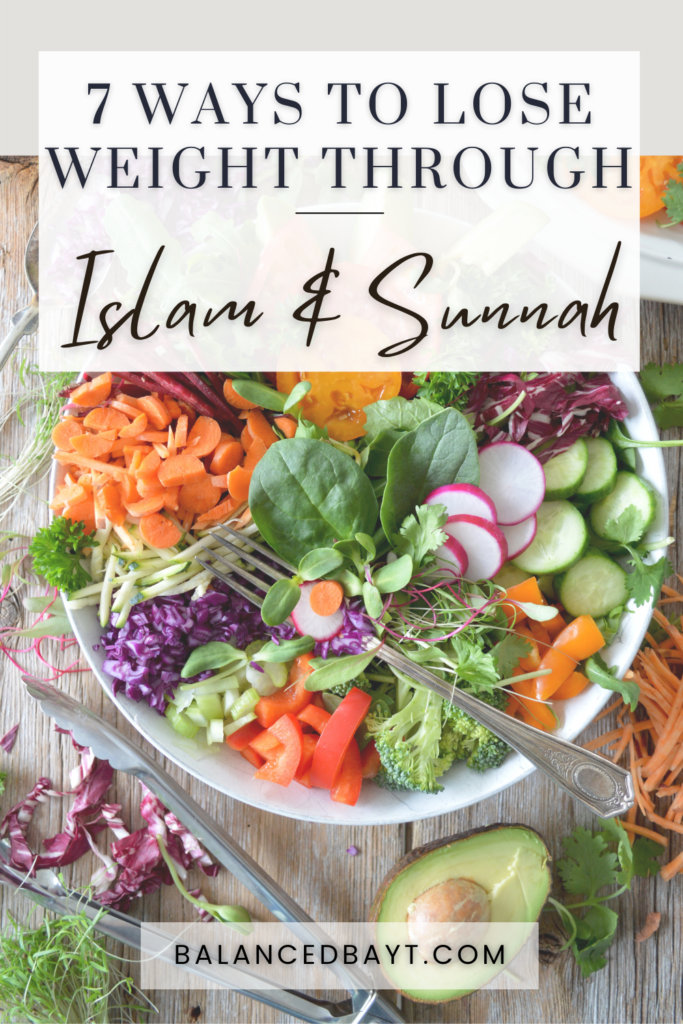As I always reiterate (and also the purpose of this blog) Islam is a way of life and there is advice and guidance on almost every topic. Being healthy and taking care of our bodies is part of Islamic etiquette. In this post, I will highlight 7 ways to lose weight through Islam and Sunnah that you can incorporate into your lifestyle from today.
With the New Year upon us, many have either over indulged during the holidays or set a resolution to either lose weight or get healthier this year.

What I will be sharing is NOT a fad diet where you feel controlled, restricted or are counting calories. Rather, it is a healthy lifestyle, one that our own Prophet (saw) lived by and hence, is part of an Islamic way of living.
Every aspect from table manners and sitting posture to eating etiquette and drinking habits have either been mentioned in the Qur’an or are part of Sunnah. With sincere determination and if followed properly, it would have us leading a healthier lifestyle naturally.
So here are 7 ways we can lose weight through Islam and Sunnah that we can learn from and incorporate into our lives inshaAllah
7 Ways to Lose Weight through Islam and Sunnah
1. Eating in Moderation
Studies have shown and proven that many diseases such as obesity and binge-eating are due to overeating. When we overeat, many harmful and negative effects can occur in the body such as:
- Can promote excess body fat
- May disrupt hunger regulation
- Increases the risk of diseases
- Can impair brain function
- May make you nauseous
- Can cause excessive gas and bloating
These are just a few examples. As the body is unable to handle all the food and break it down, it can create stress within the body and create a lot of problems. The Prophet (saw) always stressed in eating less.
According to Imam Ja’far as-Sadiq (as), man needs to eat that much food which is needed for his strength. “One part of the stomach should be for food, the second for water and third for breathing.”
The Quran also tells us not to be excessive with how much we eat and drink. If we look at all these words of advice, the takeaway point from this is to not eat until we are full but rather to keep some space.
…eat and drink, but be not excessive. Indeed, He likes not those who commit excess.
QURAN 7:31
2. Fasting
Fasting is an excellent example of how to lose weight through Islam and Sunnah. Today it has become a trend, followed and promoted by celebrities and the whole world has seen the immense benefits of Intermittent Fasting.
There are many benefits to intermittent fasting. Some of these include:
- Protecting against neurodegenerative diseases
- Reducing insulin resistance and lowering blood sugar levels
- Reducing the risk of heart disease
- Boosting metabolism for weight loss
- Helps to balance hormones
Fasting in Islam is NOT just restricted to the Holy Month of Ramadan. According to Sunnah, it should also be done on Mondays and Thursdays.

In al-Faqih: Narrated from Muhammad ibn Marwan who said: I heard Aba ‘Abdillah (as) saying: The Prophet (S) would fast so much that it would be said he does not break his fast and he would stop fasting for so long that it would be said he does not fast. Then he fasted on alternative days. Then he fasted on Mondays and Thursdays. In the end he turned to fasting three days a month: the Thursday in the beginning of the month, the Wednesday in the middle of the month and the Thursday at the end of the month; and he (S) would say: “This is the fasting of the lifetime.”
If you think about it, it sounds like a good plan. If you have over-indulged on the weekend, then fasting on Monday could be a great detox as well as it being part of Sunnah!
O you who believe, fasting is prescribed for you as it was prescribed for those before you, that you may develop God-consciousness.”
QURAN 2:183
3. Eating and Drinking Slowly
The Prophet emphasized on the importance of chewing our food properly and taking small morsels, both which are part of the Islamic manners of eating. In our fast-paced Western cultures, we see people eating on the go, grabbing fast food when they can and not being mindful of what or how they are eating
Slow eating helps in chewing the food well. In Eastern culture, particularly in Ayurveda medicine, it calls for chewing each bite of food for a minimum of 30 times. That means chewing until the food is liquefied. The process of exercising the jaws and the mixing of saliva with the food actually aids the digestive process, distills more nutrients from the food and keeps you fuller for longer.

Science today has proven that it is also important to drink water slowly rather than gulping it down to get the best absorption rate. The manner by which to drink water that the Prophet (saw) had advised was: ‘Do not drink water in one breath, but drink it in two or three breaths.’ If one drinks too fast in a short period of time, they can feel faint and experience headaches. Drinking slowly actually helps the fluid to absorb better in the body and the get the maximum benefits out of it.
4. Saying Bismillah and Being Mindful
A practice many forget to do but is also greatly part of Islam. If we are mindful about what is on our plate and the bounties God has bestowed on us, we will eat mindfully and enjoy every morsel.
Have you ever eaten whilst working or watching your favorite TV show and forgot what the meal looked or tasted like as you were so distracted? Allah is Al-Wahhab, The Giver of Gifts and The Bestower. We should always be satisfied with whatever He has given us.
By taking the time to say Bismillah before starting to eat your meal and saying Alhamdulillah after finishing, creates mindfulness. Mindful eating has been proven to help you gain a control over eating habits. It reduces binge eating as you are aware of what is going inside your body and in turn, helps to promote weight loss.
5. Correct posture
Correct posture is another practice we may easily forget or not know about. In Islamic traditions, it is emphasized in Sunnah to sit on the knees on the floor, keeping one’s weight to the left side and eating. There are many benefits for correct posture whilst eating such as:
- Promoting concentration on the task of eating
- Promotes digestion
- Prevents aspiration of food and fluid into the airways

I know in our busy schedules, it is very tempting to quickly grab something to eat whilst leaning over the kitchen island. However, this may not be the best posture for how the food is digested.
6. Sharing food
The idea of congregation is a central theme in Islam, whether through the daily prayers, during Eid or in dhikr (reciting Dua and supplications). Islam emphasizes on the importance of social gatherings and human interaction.

When we share food, we are also sharing experiences and creating bonds. Eating alone is actually Makruh (disliked by God). The Prophet (saw) had mentioned to: ‘Eat together and not separately, for the blessing is associated with the company’. When we eat with others, be it our family or friends, we are more likely to share food rather than binge or feel compelled to finish everything!
7. Eating with hands
It is mentioned in many traditions that it is a Mustahab practice (recommended) to eat with at least three fingers. Though for many, this can be a challenge (try doing it with a salad!) however when possible, we should try to eat with our hands.
It is much more difficult to binge-eat in this state and therefore, decreases overeating. For some reason, the food tastes much more delicious, you end up eating less as a spoonful of rice is more than what your fingers can hold and it has a good effect on the body.
Hopefully you can incorporate some of these ways to lose weight through Islam and Sunnah into your lives.
Are there any Islamic teachings on this subject which you currently follow? Please share them in the comments below.

